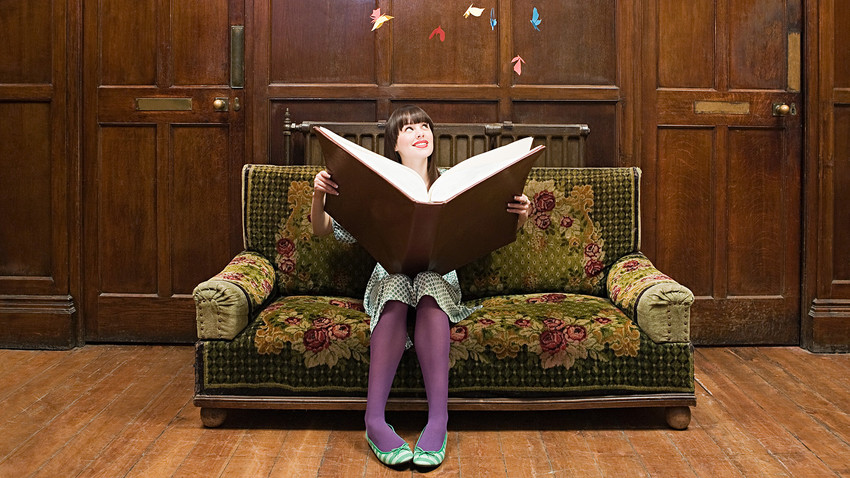7 Russian books translated into English in 2018 you need to read

1. Olga Berggolts. Daytime Stars: A Poet's Memoir of the Revolution, the Siege of Leningrad, and the Thaw

Translated by Lisa A. Kirschenbaum; University of Wisconsin Press
Poet Olga Berggolts spent the entire Siege of Leningrad in the city, and amid shelling and starvation she continued to write poems. Together with Anna Akhmatova she broadcast verse via radio. Knowing that these two women were on the other end of a microphone gave Leningraders hope.
Berggolts had a tough life: before WWII she was imprisoned for her poetry (but then released), her husband died of starvation during the siege, and her father was exiled to Siberia. In her memoirs Berggolts recalls the brutal purges during Stalin’s rule, the horror of the siege, and the Khrushchev Thaw in incredible detail.
2. Alisa Ganieva: Bride and Groom

Translated by Carol Apollonio; Deep Vellum
The plot follows a young Dagestani woman as she returns to her native town. Bride and Groom is an authentic story of Caucasus wedding traditions and portrays contemporary young people living in the conservative North Caucasus.
The author Alisa Ganieva is a Dagestani native who grew up in Moscow. She rose to fame in 2009 after her novel Salam to you, Dalgat won a literary prize for young authors – she wrote it under the male pen name “Gulla Khirachev.” The book’s narrator is a young man with a masculine worldview, and it’s hard to believe it was written by a young woman.
(Read an excerpt from the book translated by Russia Beyond).
3. Vladimir Sharov: The Rehearsals

Translated by Oliver Ready; Dedalus Books
In 17th century Russia, Patriarch Nikon lives in his New Jerusalem Monastery not far from Moscow – he’s sure that Russia is the true Promised Land. He plans to organize a theatrical performance of the New Testament to prepare for the second coming of Christ. The actors are ordinary peasants who are then replaced by their children, and so on over the next 400 years.
The author Vladimir Sharov, who passed away in 2018, played with history in all of his books. The narrative of The Rehearsals has been compared by critics to Tolstoy’s realism and Kafka’s absurdity. Sharov’s work takes a philosophical look at the Gospel and Russia’s past.
The translator Oliver Ready won the 2018 Read Russia Translation Prize for his work on the book.
4. Tatyana Tolstaya: Aetherial Worlds

Translated by Anya Migdal; Knopf
Famous emigre writer Alexander Genis compares Tolstaya’s narrative about life and love with Ivan Bunin’s texts. A selection of short stories takes the reader to different periods and worlds: Moscow and St. Petersburg, Crete and New York.
A relative of Leo Tolstoy, Tatyana is one of the most famous contemporary authors in Russia. She was first noticed as an author of short stories, but real recognition came with the post-apocalyptic dystopian novel Slynx. Based on the downfall of civilization, the language of the story is full of neologisms and various dialects.
The book is longlisted for the 2019 PEN Translation Prize.
5. Slav Sisters: The Dedalus Book of Russian Women’s Literature

Edited by Natasha Perova; Dedalus Ltd
This anthology covers the whole 20th century of female writing. It features all the most talented short stories from the silver age of female authors to contemporary ones and is translated by the best contemporary translators.
Autobiographical Sketches by Anna Akhmatova, one of the most influential female poets of the 20th century. During Stalin’s terror her husband was shot dead, her son imprisoned, and she couldn’t publish her poems; The Gift Not Made by Human Hand by Ludmila Ulitskaya is about generosity and unexpected mercy; Landscape of Loneliness: Three Voices by Nobel prize winning Svetlana Alexievich (known for her war reporting) is a touching work about about love, life, fate, and much more.
6. Eugene Vodolazkin: The Aviator

Translated by Lisa Hayden; Oneworld Publications
As part of an experiment, the protagonist of the novel is frozen in a secret lab in the Solovki gulag camp before being defrosted and brought back to life in the 1990s. As he walks the streets of his native St. Petersburg he’s shocked by everything that’s changed, even the smells and sounds. Eventually he meets the granddaughter of a woman he loved and finds that they are really alike...
If you haven't read the author’s previous bestselling book Laurus about a medieval Russian holy fool, we highly recommend it.
7. Mikhail Zoshchenko: Sentimental Tales

Translated by Boris Dralyuk; Columbia University Press/Russian Library
Mikhail Zoshchenko wrote most of his best stories in the 1920s, many of which show how the ideals of the revolution were replaced by petit bourgeois values. Zoshchenko's stories are vignettes and anecdotes: short, written in simple language, often paradoxical, and always very funny.
Though the Soviet elite considered Zoshchenko’s humor ideologically useful for blaming the "birthmarks of the old world," Stalin saw danger in his satire. So in 1946, Zoshchenko’s work was banned by special decree from literature for his “non-progressive” ideas. Publishers cancelled their contracts and the brilliant writer had to work as a shoemaker to survive.
Russia Beyond would like to thank translator and literary blogger Lisa Hayden for putting the whole list of this year translations together.
If using any of Russia Beyond's content, partly or in full, always provide an active hyperlink to the original material.
Subscribe
to our newsletter!
Get the week's best stories straight to your inbox